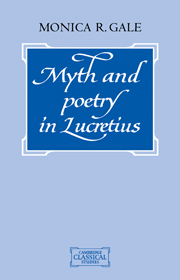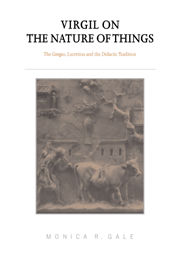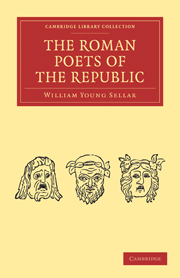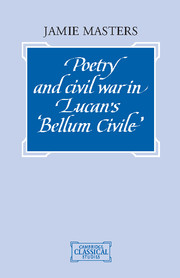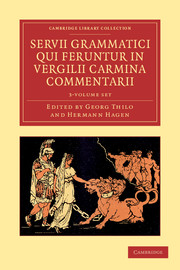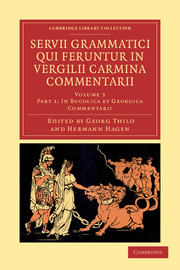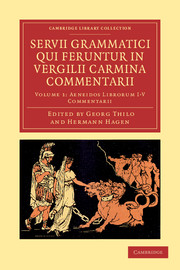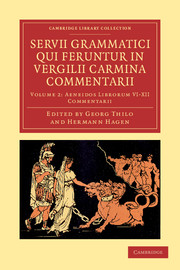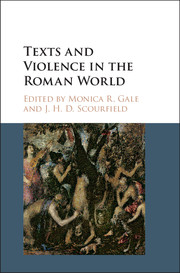Myth and Poetry in Lucretius
$59.99 (C)
Part of Cambridge Classical Studies
- Author: Monica R. Gale, Trinity College, Dublin
- Date Published: May 2007
- availability: Available
- format: Paperback
- isbn: 9780521036801
$
59.99
(C)
Paperback
Other available formats:
Hardback
Looking for an examination copy?
This title is not currently available for examination. However, if you are interested in the title for your course we can consider offering an examination copy. To register your interest please contact [email protected] providing details of the course you are teaching.
-
Lucretius' De Rerum Natura is a philosophical epic, devoted to the exposition of Epicurean philosophy. Since the system was materialistic, and highly critical of myth and poetry, Lucretius' use of mythological language and imagery is surprising. Dr. Gale considers the poem against the background of earlier and contemporary views of myth, and suggests that Lucretius was well aware of the tension between his two roles as poet and philosopher, and attempted to resolve it by developing a bold and innovative theory of myth and poetry.
Read more- Good subject - very few books on Lucretius around
- Well written and clearly and intelligently expounded book
- An important subject and a book that actually gets you somewhere
Reviews & endorsements
"What makes her [Gale] discussion exciting, at least for this reader, is the sense that this complex of ideas remains vital after two millennia; it is far more robust and viable than notions of aestheticism, art for art's sake, or the autonomous text." Classical Views
See more reviews"Gale offers a rigorous reading and well-worked out theory of the use of the divine images in a work that is repudiating divinity. Her exploration and meticulous examination of the structural elements of his poem offers a theory of meaning much more sophisticated than usually attributed to the poet and that shows how Lucretius anticipated much of modern science and philosophy." The Reader's Review
"Gale readily acknowledges the debts of this many-sided study to previous scholarship, but her lively, useful, and illuminating book has more than repaid its debt by establishing a coherent relationship between Lucretian epistemology and poetics, which does not simply extenuate but vindicates the honey on the cup." Phoenix
"This is an important book on a topic of continuing discussion. It offers some creative ways of treating Lucretius' combination of myth and poetry as what he surely meant it to be: a realization of the true meaning of his Master's thought." Bryn Mawr Classical Review
"This is, quite simply, a superb book, the merits of which I haven't the space to expound properly, nor is it possible to engage the author in the many particulars which one should very much like to argue. Gale has provided a deep and intelligent study of what must be conceded to be matters of crucial concern in understanding Lucretius....she is thorough, judicious and fair to those scholars with whom she takes issue....she writes pleasingly well: it is a genuine pleasure to see literature and philosophy discussed with such clarity. This book very much belongs on the same shelf as Diskin Clay's Lucretius and Epicurus and Philip Hardie's Cosmos and Imperium." W. Jeffery Tatum, Classical World
Customer reviews
Not yet reviewed
Be the first to review
Review was not posted due to profanity
×Product details
- Date Published: May 2007
- format: Paperback
- isbn: 9780521036801
- length: 276 pages
- dimensions: 216 x 143 x 16 mm
- weight: 0.374kg
- availability: Available
Table of Contents
Preface
List of abbreviations
Introduction
1. The philosophical background: Greek myth and mythology
2. The cultural background: myth and belief in late Republican Rome
3. The literary background: the De Rerum Natura as epic
4. Lucretius' theory of myth
5. Latent myth in the De Rerum Natura
6. The proem and the plague
Conclusion: myth as a poetic and philosophical tool
Bibliography
General Index
Index of passages cited.
Sorry, this resource is locked
Please register or sign in to request access. If you are having problems accessing these resources please email [email protected]
Register Sign in» Proceed
You are now leaving the Cambridge University Press website. Your eBook purchase and download will be completed by our partner www.ebooks.com. Please see the permission section of the www.ebooks.com catalogue page for details of the print & copy limits on our eBooks.
Continue ×Are you sure you want to delete your account?
This cannot be undone.
Thank you for your feedback which will help us improve our service.
If you requested a response, we will make sure to get back to you shortly.
×
